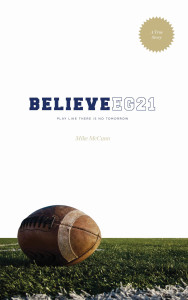“If you can’t fly, then run,
if you can’t run, then walk,
if you can’t walk, then crawl,
but whatever you do,
you have to keep moving forward.”
– Dr. Martin Luther King, Jr.
When I graduated college I had few tangible skills to show off to potential employers. I slid through a few lower level Finance and Accounting courses, specializing in neither. My chosen emphasis was Management – very broad, very bland. I did, however, have the intangibles employers sought out of inexperienced hires. Thanks to my days playing football I was ready and willing to hustle till I collapsed, I was a quick learner, I worked well with others, and I would gladly take initiative.
I was a slab of clay for my employers to mold. Whatever they taught me was the equivalent of the gold-standard; I didn’t have any other world view to reference!
This isn’t a story about me being taken advantage of (I wasn’t) or even what I learned as an impressionable young man (a lot). This is a story about compounding interest and how you can apply the same process to grow in your own career.
A Blank Canvas
When I was hired out of school, the only real-world skill I had was some experience selling vitamins to my friends and family. I had other skills, but getting a tan and swimming in the ocean didn’t open too many doors (sadly, lifeguarding isn’t a year-round gig). In 2006 I started working with a furniture company and immediately began acquiring skills.
First, I assembled furniture. Many case goods, like dinettes and bedroom sets, required assembly and I was the lowest (and only other) man on the totem pole. I unloaded trucks and helped the delivery guy on large loads. This first set of skills was obviously grunt work.
Next, I sold furniture. I was competent at the grunt work and I wanted to make more money so I sold furniture when I wasn’t sweeping floors. I am not a “natural salesperson” so this set of skills required practice. But, because I was knowledgable about the product – “This dining room takes about an hour to put together… You can carry that mattress by yourself, but you’ll need help with the sofa… No that won’t fit in the backseat of your Pontiac Thunderbird.” – my learning curve was less steep. People trusted me because of my knowledge of the product. That trust translated to sales.
Then, I became a marketer. Each salesperson was responsible for bringing in some of their own leads. We would use road signs, Craigslist ads, paper flyers, and anything that would garner attention. I used dozens of tactics to bring in customers. I wasn’t great at sales so I needed more opportunities than my peers. And because I had been selling, I knew from my conversations with customers where people shopped for furniture. I could tailor my marketing tactics to target the ideal potential customer.
 After that, I managed a team. I was well versed in the grunt work, I was competent at sales, and I had people skills. I was able to draw on my football experience for leadership and I outworked my colleagues. The other salespeople respected me for my hard work and my proficiency with the product. Because I wasn’t the best salesperson, I was a good teacher for the new people. Other, more natural sales people, could rely more on personality and charm. I had to work hard just to become adequate. I passed along all my tricks and tips so the new people could thrive quickly.
After that, I managed a team. I was well versed in the grunt work, I was competent at sales, and I had people skills. I was able to draw on my football experience for leadership and I outworked my colleagues. The other salespeople respected me for my hard work and my proficiency with the product. Because I wasn’t the best salesperson, I was a good teacher for the new people. Other, more natural sales people, could rely more on personality and charm. I had to work hard just to become adequate. I passed along all my tricks and tips so the new people could thrive quickly.
And then, I purchased furniture. The manager of each store (there were multiple operations at this point) was responsible for placing orders to replenish stock. I needed to order mattresses, case goods, and upholstery from a variety of vendors to keep inventory levels high enough to match our growing sales numbers. We didn’t use scientific ordering programs, I literally tallied product each week before making orders on an Excel spreadsheet, so some of the ordering was based on “gut feelings.” Because I still sold regularly and I taught other sales people how to market, I knew the cycles of the business.
Author’s Note: The business was setup similar to a franchise where each store ordered through the main operation, which is where I worked. There was a retail side (marketing, sales, etc.) and there was a wholesale side (grunt work, some purchasing, warehousing, etc.) of the business. I held responsibilities on both sides of the coin.
From there, I warehoused furniture. When the business expanded we added a warehouse so other stores could buy inventory from us. Some of their product went directly to them from manufacturers, but some came from our main store. I could already order product for my single store based on weekly/monthly projections, but now I had to take multiple stores into account. This meant multiple markets, multiple store owners (and their sales people), as well as shipping schedules. Because I knew how to purchase for one store, I could put myself in the shoes of the other store owners. We didn’t carry the exact same inventory, but we had most of the same processes. I could put myself in their shoes to do the ordering and then keep stock levels high enough for the company.
On top of managing stock, we had to organize the furniture. We started off with a 500 square foot storage closet and moved into 30,000+ square feet of warehouse space over time. Initially, when I was doing grunt work, I had to figure out how to maximize my space for the ups and downs of inventory levels. This mostly consisted of stacking mattresses in the 500 square foot unit. As the operation grew, we had to continue maximizing square footage. I helped install steel pallet racking and organize the warehouse for forklifts as well as multiple loading docks. Because I could do it on a small scale, understanding the larger operation came easier – though it wasn’t without its learning curves.
Eventually, I taught others to sell furniture. I ran a monthly(ish) training program called Furniture University that taught new salespeople the basics of sales. I created a specific agenda, handbooks were made, and prizes for the highest performer were awarded. The program was a success, but only because I had already been in the shoes of the sales people. I could empathize with their lack of knowledge. Because I had done their jobs, I was an effective teacher.
Finally, I invested in other furniture stores. Salespeople I taught at Furniture University often wanted to open their own stores. However, start-up capital was not always present. We entered the deal as partners: I provided cash and my experience while they brought sweat equity and some of their own money. They were profitable ventures and I’m happy to say I helped a few people start their own businesses. But I couldn’t have invested in them had I not understood the business. And better yet, had I not already been successful myself.
Think Process, Not Skill
 The most important part of my experience with the furniture company was learning that one set of skills will never suffice, you have to continue learning. I eventually quit that job, but not until I learned that you have to continue pushing your competency. You’ll never “know it all” and if you do, you’re in the wrong place. The process of continual learning (compounding interest) is what’s most important.
The most important part of my experience with the furniture company was learning that one set of skills will never suffice, you have to continue learning. I eventually quit that job, but not until I learned that you have to continue pushing your competency. You’ll never “know it all” and if you do, you’re in the wrong place. The process of continual learning (compounding interest) is what’s most important.
After I quit, I took on a huge project: I decided to write a book. I wasn’t a writer. I didn’t know how to publish a book. I didn’t have a design background. But I knew I could learn all those things if I started small. Using the same compounding interest theory I learned to write, then I improved my writing, then I learned about publishing, then about formatting…
Today, I am a published author.
Wherever you are in your career, think about what you’re doing and ask yourself, “Is this skill or set of skills going to help me toward my long-term goals?” If the answer is yes, you’re on the right track. If the answer is no, you may need to reevaluate your work status.
###
If you enjoyed this post, I recommend reading So Good They Can’t Ignore You by Cal Newport. It’s a fantastic read about what Newport calls “career capital” and what it takes to find your dream career.
Give me a shout on Twitter or leave a comment below with your best career advice or reading suggestions.

